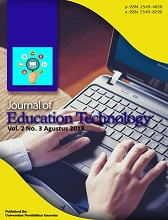Implementation of Outcome-Based Education from the Perception of Lecturers and Students
DOI:
https://doi.org/10.23887/jet.v8i3.76621Keywords:
engineering, education, outcome-based education, case studyAbstract
Outcome-based education (OBE) means clearly focusing and organizing everything in an educational system around what is essential for all students to be able to do successfully at the end of their learning experiences. This means starting with a clear picture of what is important for students to be able to do, then organizing curriculum, instruction, and assessment to make sure this learning ultimately happens. Therefore, this study aims to analyze the perceptions of lecturers and students regarding the implementation of OBE in the Faculty of Engineering. There are six variables used in this study, i.e., statement of student’s achievement, relevance of student’s achievements, subject’s preparation, teaching and learning process, supporting facilities, and evaluation. The indicators are generated according to the literature review and interview with experts, resulting 51 indicators. There are 103 students and 79 lecturers to be selected as the respondents. The respondents are asked about their opinions regarding the OBE implementation according to those indicators. Results show that from the perspective of lecturers, OBE is very well implemented regarding the variables of statement of student’s achievement, relevance of student’s achievements, and teaching and learning process; while the others are well implemented. However, from the perspective of students, OBE is fairly implemented regarding the variable of supporting facilities; while the others are well implemented.
Published
How to Cite
Issue
Section
License
Copyright (c) 2024 Mujiya Ulkhaq, Naniek Utami Handayani

This work is licensed under a Creative Commons Attribution-ShareAlike 4.0 International License.
Authors who publish with the Journal of Education Technology agree to the following terms:
- Authors retain copyright and grant the journal the right of first publication with the work simultaneously licensed under a Creative Commons Attribution License (CC BY-SA 4.0) that allows others to share the work with an acknowledgment of the work's authorship and initial publication in this journal.
- Authors are able to enter into separate, additional contractual arrangements for the non-exclusive distribution of the journal's published version of the work (e.g., post it to an institutional repository or publish it in a book), with an acknowledgment of its initial publication in this journal.
- Authors are permitted and encouraged to post their work online (e.g., in institutional repositories or on their website) prior to and during the submission process, as it can lead to productive exchanges, as well as earlier and greater citation of published work. (See The Effect of Open Access)

















